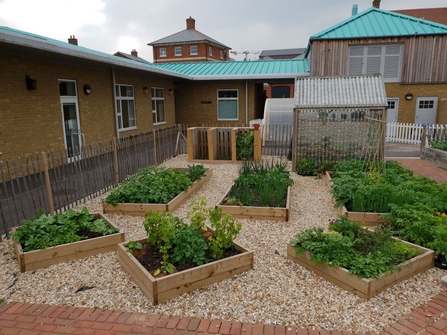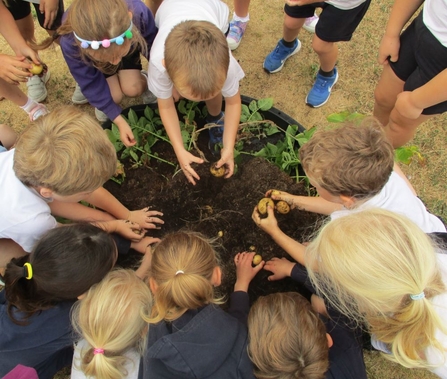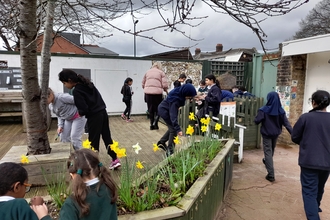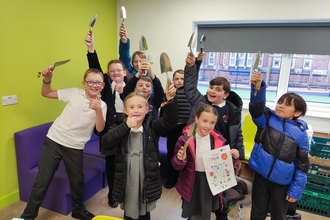School takes a holistic approach to food and gardening
Copyright Edd Moore Damers First School
All the skills learned in the school garden can help support the next generation to make our world better for everyone.
The background
At Damers First School we have a Kitchen Garden with raised beds and a plastic bottle greenhouse that was made by Year 3 children, teachers and volunteers. The whole school collected 1500 plastic bottles and sat on the school field threading the plastic bottles on to garden canes that were then nailed to the wooden frames and put up in the school kitchen garden.
All our seedlings start in our greenhouse and are then planted in our school gardens. We grow by the seasons so most things can be harvested by the children in the summer months before they go on holiday. It is so important that children understand where their food comes from and how they can do their bit to reduce their carbon footprint by what they grow and eat. The children are always amazed by the food they have grown finding out that it is much tastier to eat than what they get from the supermarket. The children learn about food airmiles learning the positives of growing your own as it travels zero air miles to get to our plates and uses less packaging and resources making it better for the environment. Time, weather, and seasonal change link so well to many National Curriculum Objectives.
The average airmiles of an onion flown to the United Kingdom is 1819 miles, Strawberries 907 miles, Potatoes 2938 miles. These fruit and vegetables can be grown in the UK by their seasons. A good website for children to use to find out how far their food has travelled is Food Miles here.

Image credit: Copyright Edd Moore Damers First School
The community and volunteers
The children work with our amazing community volunteers that come in every afternoon to work with the children across the school sharing their allotment knowledge and gardening experience. They help the children to plan what to grow using a floor plan of the garden, so everyone knows what is going in each raised bed throughout the year, how to look after what they are growing, how to harvest it and the importance of rotating what is grown in the beds each year. Some of the volunteers that help have come from Rotary and WI organisations. The volunteers look after our school gardens during the school holidays too. The children have then taken this knowledge home and had a go with their parents or even taken on an allotment themselves.
It was hard at first to get the volunteers but once we had opened our garden at the weekend taking part in ‘Open Gardens’ inviting the community to come in and see what we were doing more volunteers signed up wanting to help our garden projects. The children did tours of our garden showing members of the community around. The volunteers have been great, sourcing seeds from their allotments, friends and community. We asked parents if they had any seeds or plants they could donate. We also searched Facebook Marketplace and Gumtree finding people willing to donate unwanted fruit bushes, strawberry runners and fruit trees for free. The children set up a swap seed project in the community where people can donate their unwanted seeds or swap them for something they need.
What we do with food waste
We invested in a Ridan Food Waste Composter so all our hot and cold food waste can be composted on site saving the school money on food waste collection but also reducing our carbon footprint. It has been a great tool to teach children about natural life cycles. They make lovely compost for school gardens which has improved the nutrients in the soil making our vegetables and fruits grow quicker and better. We have even sold our compost for a donation to the local community, given it to local schools and linked up with our town council as well.
We made another garden using reuseable containers as flowerpots to give children and parents ideas of that they could use at home if they didn’t have a garden. We made a planter out of pallets, pots from wheel rims, tyres, sink, boots, wellies, potato sacks.
Local connections
We have connected with our local Garden Centre, Poundbury Gardens (part of the Gardens Group), which is a good way to receive donations of seeds, compost, plants. They are also happy to send an expert to our school to help with any questions the children have or to help the children in the garden. Garden Centres are encouraging younger people to their centres as they are the next generation of gardeners. Therefore, they are keen to work with schools and give donations of seeds, bird feed, bird boxes and split compost bags to support school projects.
The children learn that there are different varieties of fruit and vegetables for example carrots are not only orange but white, purple, red and we have linked this to learning about diversity.
The children have learned how to use the vegetables and fruits they have grown to cook a dish in the school kitchen. These have included summer fruit pudding, red, black currant, blackberry and rhubarb crumble, vegetable quiche, vegetable cottage pie. Children learn how chop, grate and peel all skills that some children have never had an opportunity of having a go at before. This then gives children the confidence to have a go at cooking at home.
We have also linked our kitchen garden to our curriculum, growing vegetables from around the world with each year group linking to a country that they are learning about in class related to Geography and Global Citizenship Curriculum. Year 1 learned about India and made onion bhajis and Year 3 learned about Italy making their vegetarian pizzas. All the recipes were used to make a school cookbook which was sold to the parents and local community. Parents were invited into try what the children had produced and cooked.

Copyright Edd Moore Damers First School
Off to market!
Every year the children put on a village show project which might include for example, the biggest courgette or potato, making chutney and jams which could then be sold to raise funds for the school garden. We have opened up our own greengrocer’s by selling produce that has been grown in the school garden after school or even taking the produce down to the local weekly market or monthly Farmers Market. This helps children’s communication skills, teamwork, maths - handling money, weighing, addition, giving change and increases their confidence. The money raised goes back into the school garden. You never know who you might meet down the market, who might be able to help support the school’s gardening scheme.
We apply for free potatoes from Grow Your Own Potatoes each year and relate the growing to our maths and weighing topic. They run a competition to see which school can grow the most potatoes, heaviest potatoes and win prizes for your school.
Gardening not only teaches the children the joys of outdoor learning and getting close to nature but also teaches them the positive impact they can have on Climate Change, the Environment, Healthy Eating, and Nutrition. All the skills learned in the school garden can help support the next generation to make our world better for everyone.
Our Top Tips:
- Find a seasonal growing calendar of what can be grown when and plan what you will grow throughout the year. Having a floor plan of your school garden is helpful. See this calendar for example.
- Connect with your local Garden Centre and share any garden projects in school that you need support with. Ask for any broken bags of compost that they can’t sell and can donate for free. Also ask for vegetable and flower seeds that they can donate. They may be able to donate some fruit bushes.
- Contact Local Rotary, WI, community garden or allotment groups asking for volunteers to work with school children and to look after the garden during the school holidays.
- Make sure what is sown can be harvested by the children during the school term as some vegetables and fruits may not be ready till the holidays and the children won’t be able to harvest or taste them.
- Short term crops (harvested during one term) include beetroot, carrots, cucumber, French beans, lettuce, courgettes, radish, spinach.
- Medium term crops can be sown in one term and harvested in the next: broad beans, cabbage, onions, peas, pumpkins sweetcorn and tomatoes, potatoes.
- Long term crops can be sown in one term and then harvested in the next term or the following: broccoli, Brussels sprouts, leeks, parsnips and potatoes.
- When starting, encourage each class to grow two vegetables from the short-term list so they see quick results which will inspire the children to grow more.
- Sign your school up to RHS Schools gardens and work through the 5 Levels. At each level there is a reward for the school when completed. These rewards include £50 National Garden Gift Vouchers, Bundle of Seeds worth £100, £200 garden gift vouchers if you achieve Level 5. Find out more here.
- Sign up to Grow Your Own Potatoes who give out a free box of seed potatoes as part of a national growing competition. Click here for their website.
- The County and Country Gardens Trusts are independent charities engaged in caring for gardens and designed landscapes throughout England and Wales and are members of The Gardens Trust. They give funding to schools for garden projects. See here for more.

The Wildlife Trusts
What do you do at your school?
If you want to tell us your story, we'd love to hear from you and share your experience on the Community Hub.


